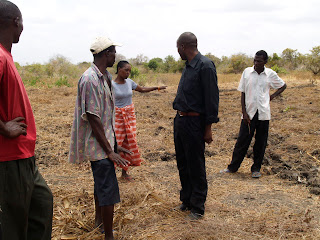Last week on Wednesday I had the opportunity to take a trip past Marafa, to a place where A Rocha Kenya is working with local farmers. They are teaching the farmers, often through churches, about something called "Farming Gods Way." This method is supposed to be better for the environment, and the farmers we talked to were seeing that it actually produced a more robust and abundant crop than the traditional way of farming. What I could not understand was why these farmers were growing corn. Corn comes from America, requires lots of water and fertilizers (or very healthy soil) to do well, and can be very harmful to the soil if grown for too many seasons in a row. So, why corn?
 |
Katana, who is 6'4" at least, with a really tall stalk of God's corn.
He said his was even taller at his own shamba. |
|
|
|
|
I asked Raphael, who is the new national director for A Rocha Kenya, why these people were farming corn. He told me that the traditional lifestyle was actually hunting and gathering, but with a population increase, they were forced into farming. I can't fully believe this, because a population likely would not be able to grow very quickly in the hunter-gatherer lifestyle due to natural checks in place. It seems to me that first a change to farming would then require population increase because of the increased demand for agriculture. The one exception I can come up with is that there was a boom in the game population, or an overabundance of the gathered foods, allowing more children to survive to adulthood. If this boom ended, then those people may have sought a way to avoid starvation, and decided to try farming.
Another interesting thing is that the switch to farming in this area happened fairly recently, only about 50 or 60 years ago. So these people did not have a well-developed traditional agriculture or traditional crops that had been selected for over hundreds of years, such as corn was in the Americas. For this reason, I am certain that this group of people was willing to accept any help or advice about what to grow that the government would give them. And the Kenyan government decided to push corn, for reasons that I do not understand. Perhaps they saw corn as being very successful in the US so they decided it would do well here (common misconception: one solution will fit all similar problems). I think that corn is probably destroying the already fragile soil that is near Marafa; it is very dry there, and the wet (growing) season is only about three months, just long enough to get a crop off.
Anyhow, back to current day in Marafa, people seem to be doing fairly well with their corn crops, and this year was particularly successful, especially for the few farmers "farming God's way." Their sheds are full of corn, and they have extra money from selling the corn to spend on whatever they choose (hopefully good things!). The two farmers we talked to (and their families) were very, very excited about this new method, and want to pass it on to other farmers in the area. They even explained how the Red Cross' method, which involves digging 2-foot holes in the ground, does very poorly compared with Farming God's Way.
 |
| One of the shambas we visited where Farming God's Way is used. |
 |
| One of the new sheds being built to hold corn. |
However, one thing that Raphael said about Farming God's Way struck me as being very odd. He said that A Rocha's business in speaking with these farmers and getting them to switch their farming methods is not about food security, but about conserving the environment. OK, A Rocha is about conserving and protecting the environment. But, what if Farming God's Way didn't work for producing enough food, or produced less and people no longer had disposable income to send their kids to school? Would A Rocha Kenya still push Farming God's Way? If these farmers understood that we don't care about their food security, would they still accept our new methods? Since, at the moment, Farming God's Way seems to be producing more food, maybe these questions will never arise. But once corn destroys the soil (and I expect that it will), what will the farmers do? Can Farming God's Way save the day? I think A Rocha Kenya has this one completely wrong, in that helping to protect the environment involves people every step of the way, and when you don't think about people, plans for the environment probably won't work. Research and adaptive co-management are crucial for understanding the impacts of Farming God's Way, and ensuring that the farmers and the families involved are completely involved in the implementation of the program.
 |
| These are the people who's families we need to be thinking about. |




No comments:
Post a Comment